

National Security Archive/COLD WAR/Interviews. COLD WAR ARCHIVES - Berlin Air Lift (laker 2) Q: What was the worst aspect of the airlift for you?
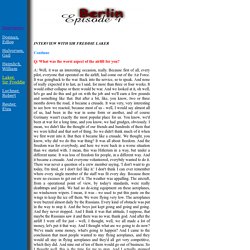
A: Well, it was an interesting occasion, really. Because first of all, every pilot, everyone that operated on the airlift, had come out of the Air Force. It was goingback to the war. Back into the service, so to speak. And none of really expected it to last, as I said, for more than three or four weeks. (interruption, tape change) Q: I want to take you back to the airlift, and you're in an airlift and what's going to happen with the Soviets, are they going to stop you? A: Well, the answer's really yes and no. Q: What other aspects of flying into Berlin at this time made you nervous?
Q: You were carrying all sorts of cargoes. A: Well, I think the worst cargo was coal. because of the coal dust. you know, the broken bags and that sort of thing. Q: There were some stories about backloading, where people would fly stuff out and certain sort of - a lot of RAF planes carried sort of a lot of loot out of Berlin. National Security Archive/COLD WAR/Interviews. National Security Archive/COLD WAR/Interviews. Japan Hiroshima Atomic Bomb Re enactment‏ Capitalism and Socialism: Crash Course World History #33. USA vs USSR Fight! The Cold War: Crash Course World History #39. Origins of the Cold War 1945-49.
FOUR causes of the Cold War [BARE].
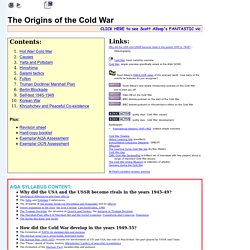
NINE events which caused the Cold War. FOUR decisions made at the Yalta Conference. TWO decisions and three disagreements at the Potsdam conference. The ‘salami tactics’ that brought Communists to power in Eastern Europe FIVE causes [CABAN] and FOUR results [CENA] of the Berlin crisis, 1948–9. FIVE ‘Berlin Airlift Facts’. EARLY COLD WAR WAUGH 227 48. RAVISHING THE WOMEN OF CONQUERED EUROPE. They raped every German female from eight to 80. Science Fiction in the Fifties: The Real Golden Age. Historians of science fiction often speak of the years 1939–1942 as "the golden age.
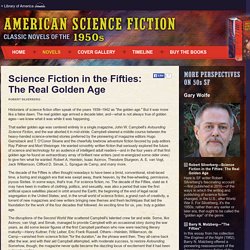
" But it was more like a false dawn. The real golden age arrived a decade later, and—what is not always true of golden ages—we knew what it was while it was happening. That earlier golden age was centered entirely in a single magazine, John W. Campbell's Astounding Science Fiction, and the war aborted it in mid-stride.
Campbell steered a middle course between the heavy-handed science-oriented stories preferred by the pioneering sf magazine editors Hugo Gernsback and T. The decade of the Fifties is often thought nowadays to have been a timid, conventional, strait-laced time, a boring and sluggish era that was swept away, thank heaven, by the free-wheeling, permissive, joyous Sixties. The disruptions of the Second World War scattered Campbell's talented crew far and wide. Many of Campbell's original stars were still in their prime, indeed had much of their best work still ahead. A golden age, yes.
I know. The Cold War - Lesson Plans. Korean War. The Korean War (25 June 1950 – 27 July 1953)[29][a][31] was a war between the Republic of Korea (South Korea), supported by the United Nations, and the Democratic People's Republic of Korea (North Korea), at one time supported by China and the Soviet Union.
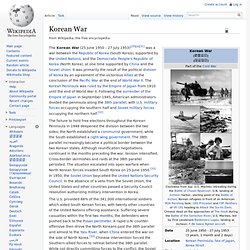
Cold War. Photograph of the Berlin Wall taken from the West side.
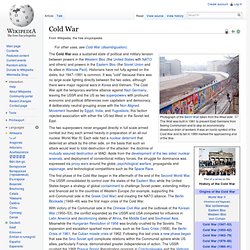
The Wall was built in 1961 to prevent East Germans from fleeing Communism and to stop an economically disastrous drain of workers. It was an iconic symbol of the Cold War and its fall in 1989 marked the approaching end of the War. The Cold War was a sustained state of political and military tension between powers in the Western Bloc (the United States with NATO and others) and powers in the Eastern Bloc (the Soviet Union and its allies in Warsaw Pact). Historians have not fully agreed on the dates, but 1947–1991 is common. It was "cold" because there was no large-scale fighting directly between the two sides, although there were major regional wars in Korea and Vietnam.
The two superpowers never engaged directly in full-scale armed combat but they each armed heavily in preparation of an all-out nuclear World War III. GCSE Bitesize - The Cold War.